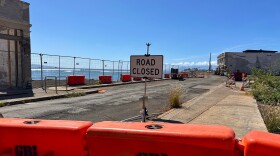Hawai?i’s first medical marijuana dispensary opened for business on Maui yesterday. The dispensary is one of two licensed to serve patients in Maui County. But what about patients living on Moloka?i and L?na?i? HPR’s Ku?uwehi Hiraishi has this story.
Maui County’s unique geography is posing a challenge for the more than 250 patients living on Moloka?i and L?na?i, where there currently are no plans for a medical marijuana dispensary. Keith Ridley is head of the state Department of Health’s Office of Health Care Assurance.
“If they want to buy products from a dispensary, they would need to go to an island where the products are being sold,” says Ridley, “But they really would not be able to carry those products on an airplane or a ferry or what have you to another island.”
Ridley says there are options.
“Under the current system, any patient who is not on an island where there is a dispensary are able to continue to grow their own medical cannabis,” says Ridley.
Certified patients can also have a caregiver grow the medical cannabis for them. But without a dispensary on island, interisland transportation within Maui County remains the issue. Carl Bergquist is the Executive Director of the non-profit Drug Policy Forum of Hawai’i.
“The law is clear unfortunately from our perspective that it says, interisland transportation of medicine is prohibited,” says Bergquist, “So currently those patients have no protection from state prosecution.”
Bergquist advocates a change to state law to remove this prohibition, and points to Oregon’s approach to traveling with medical marijuana.
“If they are traveling with medicine and they’re registered, they can travel in state on an airplane,” says Bergquist, “The kind of logic that Oregon has applied to traveling within the state should definitely be applicable to the patients within our state.”
But even if the law changed, the cost-benefit analysis within the current system is not favorable for business says Christopher Garth. He is the executive director and cofounder of the Hawaii Dispensary Alliance, a kind of chamber of commerce for Hawai’i’s medical cannabis industry.
“Because it’s a vertically integrated system, any of the cost of that would be associated with developing a retail facility, manufacturing facility, and grow facility would ultimately be passed on to the consumer,” says Garth.
Garth says patients would skip the expensive dispensary in favor of growing their own medical marijuana or buying it from the unregulated, black market. Increasing competition simply for the retail business, says Garth, could offer Moloka’i and Lana’i patients more options.
“You have different wholesalers growing and different wholesalers creating a manufactured product. And then different retailers. Ideally, there are other licenses as well for be it transportation, or delivery, or even lab certification,” says Garth, “More options. More competition. Lower price points.”




